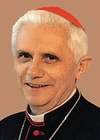Personality of the Week: His Holiness Pope Benedict XVI
A bridge between the times?

Joseph Ratzinger becomes Pope Benedict XVI, the eighth German Pope in history. His conservative ideals make him a representative of the traditional wing of the church, maintaining the status quo and continuing the line followed by Pope John Paul II, who he advised for over twenty years.
Born on 16th April 1927 in Bavaria, his early years were affected by the Second World War. He was forced into the Hitler Youth in 1941 and studied at the Seminary of Traunstein, but his studies were interrupted when he was made to join the Wehrmacht in an anti-aircraft unit. He deserted from the army near the end of the war and was held by the allies briefly as a prisoner of war.
Continuing his studies, he entered the theological institute Herzogliches Georgianum in 1947, being ordained into the priesthood along with his brother Georg on 29th June, 1951. Two years later, he defended his Doctorate of Theology.
In academic life, he became Professor of Fundamental Theology at Bonn in 1959 and in 1966, Professor of Dogmatic Theology at Tuebingen University and three years later, transferred to Regensburg University, where he rose to be its Dean and Vice-President.
From 1962 to 1965, he was chief theological advisor to Cardinal Frings of Cologne at the Second Vatican Council, where he had the chance to get to know Karol Wojtyla. He became Archbishop of Munich in 1977 and Pope Paul VI made him a Cardinal one month later.
In 1980, Pope John Paul II nominated him as Chairman of the Synod of the Laity. He took up his position in the Vatican in 1981 as Prefect for the Congregation for the Doctrine of the Faith, gaining fame as an intellectual with clear ideas on where the church should stand and taking a position against the Liberation Theology of Latin America, which defended a closer relationship between the Church and social activism, becoming more involved in human rights issues.
He was the mouthpiece of the Vatican's policy against homosexuality and gay marriage in 1986 and over the years, has professed clear opinions against other non-Christian and Christian religions. His defence of the document Dominus Iesus in 2000, which declared that Anglicanism and protest religions were deficient, and his statement that the “auto-erotic spirituality” of Buddhism, Hinduism and other Eastern religions created false hope, caused outrage.
In 2002, he became Dean of the College of Cardinals, presiding over the funeral of Pope John Paul II. Today, the 115 cardinals gathered in the Sistine Chapel elected him the 265th Pope in the history of the Roman Catholic Church. The choice of Joseph Ratzinger will not please all members of the Church. It is the continuation of the hegemony of the Old Continent in the Old Church and does not take into account the more liberal ideas of the political left wing of the Catholic Church, neither does it augur well for a continuation of dialogue between religions, if as Pope Benedict XVI, Joseph Ratzinger adopts a top-down attitude.
Or, could it be that at 78, Pope Benedict XVI is a bridge between the times as the Old Church transforms into the new, during a deep-rooted process of discussion at all levels while a more representative and more democratic model, which represents today's world and demographic trends, is formed?
Subscribe to Pravda.Ru Telegram channel, Facebook, RSS!


